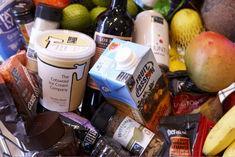
The Co-operative was the first UK supermarket to launch an own-brand Fairtrade product in 2000. Today, the retailer boasts 150 own-brand Fairtrade products and more than 50 branded Fairtrade products.
“In 1998, we launched our own long-term plan to ‘mainstream’ Fairtrade and our commitment to Fairtrade remains as strong today as ever,” says Brad Hill, Fairtrade strategic development manager at The Co-operative, who has championed Fairtrade for the last 10 years. “Through ongoing campaigning, product innovation and leadership, we have helped develop the UK into one of the largest Fairtrade markets in the world, supporting millions of growers and producers in developing countries.
“Fairtrade ensures that disadvantaged producers in developing countries get a better deal for their crop. The premium that they receive can be used to improve their working and living conditions and go to community projects, such as providing clean drinking water,” he explains.
The Co-operative range of Fairtrade fresh fruits includes bananas, pineapples, mangoes, grapes and oranges. Bananas were introduced in 2000 and bought from producer group Volta River Estates Ltd (VREL) in Ghana. The Co-operative now has a long-term relationship with VREL and the local community. Thanks to the premium, The Co-operative customers have helped support many social community projects.
“Fairtrade is about developing a relationship with a community and being instrumental in helping it grow,” Hill explains. “The real difference that Fairtrade makes is on the ground. Workers and their communities have benefited from lots of different projects; schoolchildren have been provided with uniforms, while workers have received mosquito nets and boots to protect them from snakes, as well as bicycles so they don’t have to walk the long distance to work. There has also been investment in new school buildings and computer facilities for pupils, to help them to get out of the poverty cycle, as well as water and sanitation provision…
“This is the reason why The Co-operative continues to look for new ideas to introduce Fairtrade products into our range, to give customers as much choice as possible and to drive Fairtrade growth in the UK market.”
Overall, sales of Fairtrade at The Co-operative continue to go from strength to strength and were up 44 per cent in 2008.
Supermarkets such as The Co-operative source from Fairtrade-certified traders like AgroFair and Univeg, which buy from FLO-certified producers and help to ensure sustainability across the supply chain. The Fairtrade Foundation has a dedicated team of business development managers who work closely with traders. “We have market responsibility with retailers and product responsibility working with UK licencees,” says Jane Snell, who looks after fresh fruit at the foundation. “The good thing about Fairtrade is that it is possible to make trade work for disadvantaged producers in developing countries and still run a successful business. It isn’t about charity or hand-outs, but a better trading relationship.
“In this model, we acknowledge that supermarkets do not operate as charities. They treat Fairtrade products like other products - neither increasing their profit margins over conventional products, nor reducing or giving up their profits altogether. Because if Fairtrade products are not profitable at all, then any new business pressure on these companies could result in their removal from the shop shelves altogether and replacement with more profitable alternatives. That would certainly be a disaster for the producers involved in Fairtrade.”
Asda tropical fruit buyer Claire Brown did, until recently, also manage the Fairtrade category, sourcing from Univeg. The UK number-two supermarket stocks more than 100 different Fairtrade products, including around seven or more core tropical fruit lines, depending on season, but always including oranges. “When we introduced Fairtrade in 2005, it added value to the tropical and exotic fruit category,” says Brown. “Over the last four years, Asda has worked hard to develop the market and we were the first retailer to launch limes with the Fairtrade mark.
“We have always kept the pricing of Fairtrade products competitive and despite the current economic climate, we have found that consumers are continuing to buy Fairtrade. Even if they have to pay a few pence extra, they don’t mind as they know it is benefiting a producer and a community somewhere.”
Brown, who like Hill has seen first-hand the benefit of Fairtrade on communities, says Asda remains committed to Fairtrade and developing the category.
In April, research by GlobeScan commissioned by Fairtrade Labelling Organizations International (FLO), of which the Fairtrade Foundation is the UK member, revealed that nearly half of UK consumers are ethically active, with high expectations of corporate responsibility.
In the UK, 82 per cent of people say they recognise the Fairtrade mark. Of these people, 94 per cent say they trust it.More than three-quarters of shoppers - 77 per cent - believe that Fairtrade has strict standards and again, more than three-quarters of shoppers - 77 per cent - believe that independent certification is the best way to verify a product’s ethical claims.
Harriet Lamb, executive director of the Fairtrade Foundation, says: “The results reveal that consumers are calling for a new model in trade, in which justice and equity are integral parts of the transaction. These attitudes are fuelling support for Fairtrade as more consumers identify with its values.
“Times are hard for everyone but it is great to see that consumers understand it is particularly difficult for farmers in developing countries and are therefore continuing to buy Fairtrade.”
The Fairtrade Foundation launched its Tipping the Balance strategy last year, with the aim of benefiting twice as many producers by 2012, while supporting those already supplying the UK market to double the proportion of the crop they sell through the Fairtrade system.



